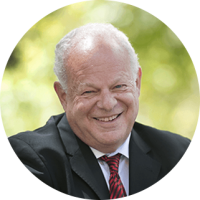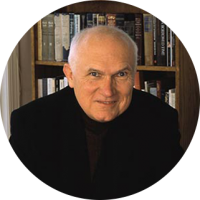The Imagination Institute, an independent non-profit based out of Philadelphia and made possible by the support of the John Templeton Foundation, is dedicated to making progress on the measurement, growth, and improvement of imagination across all sectors of society.
Grants Competition
The Imagination Institute hosted a grants competition titled Advancing the Science of Imagination: Toward an “Imagination Quotient” to test, validate and develop an intervention for imagination and perspective. See here for the list of award recipients.
Imagination Retreats
The Imagination Institute hosted a series of events to bring together researchers with notable imaginative and creative individuals in academic, cultural, and organizational domains. The purpose of these events is to further refine our understanding of the domain specificity of imagination and of future funding.
Meet Our Team
Leadership

Martin Seligman
Executive Director
Martin E.P. Seligman is the Zellerbach Family professor of psychology and director of the Positive Psychology Center at the University of Pennsylvania, where he focuses on positive psychology, learned helplessness, depression, ethno-political conflict, and optimism. He is a best-selling author of several books including, most recently, Flourish. He received the American Psychological Society’s William James Fellow Award for basic science and Cattell Award for the application of science, and two Distinguished Scientific Contribution awards from the American Psychological Association. In 1996, Seligman was elected president of the American Psychological Association by the largest vote in modern history. His current mission is the attempt to transform social science to work on the best things in life—virtue, positive emotion, good relationships, and positive institutions—and not just on healing pathology.

Scott Barry Kaufman
Scientific Director
Scott Barry Kaufman is scientific director of the Imagination Institute in the Positive Psychology Center at the University of Pennsylvania, where he investigates the measurement and development of intelligence, imagination, and creativity. Kaufman has authored/edited 7 books, including Wired to Create: Unraveling the Mysteries of the Creative Mind (with Carolyn Gregoire), Ungifted: Intelligence Redefined, The Complexity of Greatness: Beyond Talent or Practice, and The Philosophy of Creativity (with Elliot Samuel Paul). Kaufman is also co-founder of The Creativity Post, host of The Psychology Podcast, and he writes the blog Beautiful Minds for Scientific American. Kaufman completed his doctorate in cognitive psychology from Yale University in 2009 and received his masters degree in experimental psychology from Cambridge University in 2005, where he was a Gates Cambridge Scholar.
Coordinators

Victoria Schwartz
Event Coordinator
Victoria Schwartz is the institute’s event coordinator. She is responsible for all on-site arrangements to ensure that each program advances the mission of the institute. Victoria is also president of With You Events, a Philadelphia-area company that specializes in weddings and special events.
Researchers

Elizabeth Hyde
Research Specialist
Elizabeth Hyde graduated from the University of Pennsylvania in 2014 with a double major in Psychology and French and a minor in Anthropology. She wants to know what it means to live authentically, and how imagination, creativity, and openness to experience inform this question. Other burgeoning research interests of hers include awe, passion, and vulnerability.

Marie Forgeard
Lead Scientific Consultant
Marie Forgeard, PhD, is a post-doctoral fellow at McLean Hospital and lead scientific consultant at the Imagination Institute. Her research focuses on understanding when and how creative thinking and behavior may enhance well-being. To that end, she has investigated the role of motivational styles, personality, psychological flexibility, and self-efficacy, among other constructs. Her past studies have examined this topic in a variety of samples, including professional/aspiring artists and scientists, individuals having experienced highly stressful life events, as well as individuals suffering from psychopathology. Dr. Forgeard was the 2013 recipient of the Frank X. Barron Award from Division 10 of the American Psychological Association (the Society for the Psychology of Aesthetics, Creativity, and the Arts). Her research has also been funded by grants from the John Templeton Foundation.

Taylor Kreiss
Director of Special Projects
Specializing in existential positive psychology, Taylor Kreiss is a writer on a mission to share the art and science of the good life. A UCLA philosophy graduate and UPenn positive psychology grad-student, he is currently an executive producer for The Psychology Podcast with Scott Barry Kaufman PhD, an editor for TheCreativityPost and a writer for creativity/philosophy/positive psychology blogs. He would call himself “A (sometimes) rational animal helping people get real about happiness, meaning and purpose.” If you would like to connect, please feel free to email or follow on Facebook.

Jordyn Feingold
Chief Extravert
Jordyn Feingold is a recent graduate of the University of Pennsylvania currently working toward her Master’s of Applied Positive Psychology here at Penn. Jordyn is deeply passionate about bridging the gap between health and happiness and finding ways to incorporate Positive Psychology into a healthcare setting through the doctor/patient relationship, medical education, mindfulness practice, and an emphasis on treating the ‘whole patient.’ Through imagination, Jordyn believes that we can create more sustainable practices to live longer and better. She will be attending medical school after getting her masters, and looks forward to bringing Positive Psychology into her eventual medical practice and working toward sparking a paradigm shift in the medical field.
Board of Directors

Martin Seligman
Chairman
Martin E.P. Seligman is the Zellerbach Family professor of psychology and director of the Positive Psychology Center at the University of Pennsylvania, where he focuses on positive psychology, learned helplessness, depression, ethno-political conflict, and optimism. He is a best-selling author of several books including, most recently, Flourish. He received the American Psychological Society’s William James Fellow Award for basic science and Cattell Award for the application of science, and two Distinguished Scientific Contribution awards from the American Psychological Association. In 1996, Seligman was elected president of the American Psychological Association by the largest vote in modern history. His current mission is the attempt to transform social science to work on the best things in life—virtue, positive emotion, good relationships, and positive institutions—and not just on healing pathology.

Joe Kluger
Joe Kluger is a Principal of WolfBrown. He has over 35 years of experience as an arts and culture executive and consultant in strategic planning, organizational collaboration, facilities, fund raising, governance, leadership development and succession planning projects for nonprofit museums, theaters, opera companies, symphony orchestras, performing arts centers, and educational institutions. Prior to his consulting career, Joe held leadership positions in the symphony field, including President of The Philadelphia Orchestra Association (1989-2005), where he helped develop the Kimmel Center for the Performing Arts and raised over $130 million for endowment. He joined The Philadelphia Orchestra in 1985 as General Manager, after seven years with the New York Philharmonic, where he had been on staff in a variety of positions, culminating in the position of Orchestra Manager. Mr. Kluger is currently Chair of Philadelphia Mayor Nutter’s Cultural Advisory Council and serves on the Boards of the National Philanthropic Trust and the Board of Overseers of the Curtis Institute of Music. He has previously served as a Theatre Ambassador of the Theatre Alliance of Greater Philadelphia and on the Boards of the Marian Anderson Award, Philadelphia Convention and Visitors Bureau, the Arts and Business Council of Philadelphia, Sunderman Conservatory at Gettysburg College and the Greater Philadelphia Cultural Alliance, of which he is a past President.

Eileen Heisman
Eileen R. Heisman, ACFRE, is the President and CEO of NPT. She is a nationally recognized expert on charitable and planned giving. Ms. Heisman has been interviewed about philanthropy and donor-advised funds on major broadcast media and by nearly every national newspaper and major trade publication. She was among the first fundraising professionals to earn the distinguished ACFRE certification. In 2011, she was named by NonProfit Times as one of their Power and Influence Top 50, an annual listing of the 50 most influential executives in the philanthropic sector. In 2013, she was invited by the Chinese government to speak to their emerging nonprofit sector about philanthropy. She is a recipient of the 2013 American Association of Ben Gurion University of the Negev Mid-Atantic Chapter’s Women of Distinction Award. She is also the Association of Fundraising Professionals’ 2014 Outstanding Fundraising Professional. Ms. Heisman is currently a member of the faculty at Leadership Philadelphia, as well as an adjunct faculty member the University of Michigan’s School of Social Work graduate program and at the University of Pennsylvania’s School of Social Policy and Practice. She is a regular lecturer for the Nonprofit Board Leadership Program at the University of Pennsylvania’s Wharton School and a member of the Governance Committee for the Nonprofit Leadership Program at the University of Pennsylvania’s School of Social Policy and Practice. Ms. Heisman serves on the Advisory Board at New York University’s George H. Heyman, Jr. Center for Philanthropy and Fundraising, the Community Foundation of Singapore and the University of Michigan’s School of Social Work. She is also a member of the Board of Directors at the Arden Theater Company and Chair of the Board at CultureTrust.
Board of Scientific Advisors

Angela Duckworth
Dr. Angela Lee Duckworth is an associate professor of psychology at the University of Pennsylvania and a 2013 MacArthur Fellow. Angela studies non-IQ competencies, including self-control and grit, which predict success both academically and professionally. Her research populations have included West Point cadets, National Spelling Bee finalists, novice teachers, salespeople, and students. Angela received a BA in Neurobiology from Harvard in 1992 and, as a Marshall Scholar, a Masters in Neuroscience from Oxford. She completed her PhD in psychology at the University of Pennsylvania. Prior to her career in research, Angela founded a non-profit summer school for low-income children which won the Better Government Award for the state of Massachusetts and was profiled as a Harvard Kennedy School case study. Angela has also been a McKinsey management consultant and, for five years, a math teacher in the public schools of San Francisco, Philadelphia, and New York City.

Rex Jung
Rex Jung is an assistant professor of neurosurgery at the University of New Mexico and a practicing clinical neuropsychologist in Albuquerque, New Mexico. He studies both brain disease and what the brain does well—a field of research known as “positive neuroscience.” His research is designed to relate behavioral measures, including intelligence, personality, and creativity, to brain function and structure in healthy, neurological, and psychiatric subjects. He has published over 70 research articles across a wide range of disciplines, including traumatic brain injury, lupus, schizophrenia, intelligence, personality, and creativity. He has been funded by the National Institutes of Health, DARPA, the John Templeton Foundation, the Johnson O’Connor Foundation, and the National Endowment for the Arts. He is on the Editorial Boards of PLoS ONE, Intelligence, Frontiers, and the International Journal of Personality Psychology. His work has been featured widely in the popular press, including CNN, BBC, The Washington Post, The New York Times, and the The Huffington Post.

Richard Powers
Richard Powers is the author of eleven novels that explore connections among disparate disciplines such as photography, artificial intelligence, music composition, molecular biology, game theory, virtual reality, business, and neuroscience. His books have received various prizes, including the Rosenthal and Vursell Awards, both from the American Academy of Arts and Letters; the James Fenimore Cooper Prize, Society of American Historians; the Corrington Award; a PEN/Hemingway Special Citation; the W. H. Smith Literary Award (U.K.); the Dos Passos Prize; the Ambassador Book Award of the English Speaking Union, and TIME Magazine’s Book of the Year. He is a MacArthur fellow, a fellow of the American Academy of Arts and Sciences, a recipient of a Lannan Literary Award, a finalist for the Pulitzer Prize, a fellow of the American Academy of Arts and Letters, and winner of the 2006 National Book Award.

Robert Scales
Retired General (Dr.) Robert Scales is one of America’s best known and most respected authorities on land warfare. Immediately after retirement from the Army he was appointed President and CEO of Walden University located in Baltimore, Maryland. Dr. Scales served over thirty years in the Army, retiring as a Major General. He commanded two units in Vietnam, winning the Silver Star for action during the battles around Dong Ap Bia (Hamburger Hill) during the summer of 1969. Subsequently, he served in command and staff positions in the United States, Germany, and Korea and ended his military career as Commandant of the United States Army War College. In 1995 he created the Army After Next program which was the Army’s first attempt to build a strategic game and operational concept for future land warfare. He has written and lectured on warfare to academic, government, military, and business groups in the United States, Australia, Asia, the Middle East, Europe, and South America. He is the author of two books on military history: Certain Victory, the official account of the Army in the Gulf War and Firepower in Limited War, a history of the evolution of firepower doctrine since the end of the Korean War. In addition he is an authority on contemporary and future warfare. Concepts and ideas contained in his writings and studies have significant influenced the course of contemporary modernization and reform within the military. He has written two books on the theory of warfare: Future Warfare, a strategic anthology on America’s wars to come and Yellow Smoke: the Future of Land Warfare for America’s Military. He was the only serving officer to have written books subsequently selected for inclusion in the official reading lists of three services; Certain Victory for the Army, Firepower for the Marine Corps and Yellow Smoke for the Navy. Congressman Ike Skelton has included Yellow Smoke in his National Security Book List sponsored by National Defense University. His latest work, The Iraq War: a Military History, written with Williamson Murray has been reviewed very favorably by the New York Times, Atlantic and Foreign Affairs. He is a frequent consultant with the senior leadership of every service in the Department of Defense as well as Congress and many allied militaries. He has testified seven times before the Senate and House Armed Services as well as the Foreign Relations and Environmental Committees of the Senate. He was honored to be the twentieth Nimitz Memorial Lecturer in 2004. In 2010 he was appointed as a member of the Congressional Quadrennial Defense Review. He is senior military analyst for The BBC, National Public Radio and Fox News Network. He has appeared as a commentator on The History Channel., The Discovery Channel, PBS, TLC and Star Television. His commentary is carried frequently on all major television outlets in the Peoples Republic of China. He has written for and been frequently quoted in The New York Post, The Wall Street Journal, The Washington Post, The Washington Times, Time Magazine, Newsweek, Roll Call and virtually every service defense periodical and media network on issues relating to military history, future warfare and defense policy. He is a graduate of West Point and earned his PhD in history from Duke University. He can be contacted at: roberthscales@colgen.net

Dean Keith Simonton
Dean Keith Simonton (PhD 1975 Harvard University) is Distinguished Professor of Psychology at the University of California, Davis. His bibliography lists more than 470 publications, including more than a dozen books. Among the latter are Genius, Creativity, and Leadership; Scientific Genius; Greatness; Genius and Creativity; Origins of Genius; Great Psychologists and Their Times; Creativity in Science; Genius 101; Great Flicks; the Social Science of Cinema; and the Handbook of Genius. Simonton received the William James Book Award, Sir Francis Galton Award for Outstanding Contributions to the Study of Creativity, the Rudolf Arnheim Award for Outstanding Achievement in Psychology and the Arts, the Theoretical Innovation Prize in Personality and Social Psychology, the George A. Miller Outstanding Article Award, the E. Paul Torrance and President’s Awards from the National Association for Gifted Children, the Distinguished Scientific Contributions to Media Psychology Award, three Mensa Awards for Excellence in Research, and the Joseph B. Gittler Award for “the most scholarly contribution to the philosophical foundation of psychological knowledge.” He is Fellow of several professional organizations, including the American Association for the Advancement of Science, the American Psychological Society, and eleven divisions of the American Psychological Association (APA). He has served as President of the International Association of Empirical Aesthetics, the Society for the Psychology of Aesthetics, Creativity and the Arts (APA, Division 10), and the Society for General Psychology (APA, Division 1)

Robert Sternberg
Robert J. Sternberg is Professor of Human Development at Cornell University. Prior to that, he held various academic positions, including as IBM Professor of Psychology and Education and Professor of Management at Yale University. Sternberg’s PhD is from Stanford and he holds 13 honorary doctorates. He is a member of the National Academy of Arts and Sciences and the National Academy of Education. Sternberg is a former president of the American Psychological Association and the Federation of Associations in Behavioral and Brain Sciences.
